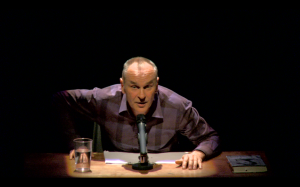daniel macivor
Daniel MacIvor’s newest solo show, Who Killed Spalding Gray?, a collaboration with director Daniel Brooks, begins with an interview with an audience member where MacIvor asks this person who they are, who he is and who Spalding Gray was. On Sunday Night at the LuminaTO Festival’s 7 Monologues Series in Toronto the audience member was a young theatre student, who was quick to proclaim that MacIvor was one of Canada’s most celebrated playwrights, but was stuck on the details of Spalding Gray. In another city, at another time, the results may be switched. Gray, after all, was a successful American monologuist who worked with the Performance Group and the Wooster Group and became known as a celebrated figure in the American Theatre for telling fictitious stories as though they were the truth. He also played Fran Drescher’s therapist on The Nanny. On January 11, 2004 he committed suicide after riding the Staten Island ferry back and forth all night. Earlier that night he and his son had seen Tim Burton’s film Big Fish at the movie theatre, and he had stayed behind after it was over for some time and wept. Big Fish is also the story of a man who tells stories, claiming they are true, but his son believes them to be false. The last line of the film is “A man tells a story over and over so many times he becomes the story. In that way, he is immortal.”
Celebrated Canadian playwright Daniel MacIvor has made his career from telling the same stories over and over, to audiences all over the world. While Gray’s stories were presented as fact and were fiction, MacIvor states that his stories are presented as fiction, and yet, he is not sure that they aren’t true. The truth, of course, is subjective. In Who Killed Spalding Gray? MacIvor tells a story that some audience members may find difficult to believe. In January, 2004 he was in California having “an entity” removed by a “physic surgeon” at the urging of his ex-boyfriend, who was convinced that this entity was trying to kill him. MacIvor had been afflicted with a sense of unease for quite some time, a feeling of not quite fitting, which had left him in a dark and fragile place, and he wanted to see the removal of this entity as a new beginning, a burden being lifted, with brighter skies ahead of him. He was looking for significance wherever he could find it. The same day that Spalding Gray committed suicide in New York MacIvor’s entity was killed by a physic surgeon in California. Are these two stories connected?
MacIvor also tells us about a man named Howard who wants to commit suicide but is too afraid of failure to try. Howard also tells the same stories over and over and his stories also initially appear to be true, but are later revealed to be false. The difference between Howard and MacIvor and Gray is that Howard doesn’t have an audience for his stories except in his own head. Through Howard we see the power of the stories that we tell ourselves, and how, regardless of whether they are true or false, positive or negative, they strengthen and inform our perceptions of ourselves, others and our lives, the more that we repeat them. What story was Spalding Gray repeating in his own head when he was riding the Staten Island ferry back and forth that cold night in January in 2004 just before he decided to end his life? Did the story that MacIvor told himself about his entity being successfully removed in California change the direction of his future? Does the truth of these stories matter when the consequences of someone’s belief in them are so intensely and tangibly real?
There is something incredibly jubilant in MacIvor’s performance of this piece, despite the fact that the subject matter is so dark and infused with much melancholy. At times, in the light MacIvor looked to me akin to a young boy, and his ease to sing and to dance and to play, directly, with the audience alludes to the light after the entity, alludes to the active choosing to swim, rather than to drown. Brooks gives the stage a sense of openness, as well, and fluidity, the light doesn’t cling to MacIvor as close in the darkness, separating him completely from an audience he may be afraid of. There is no sense of fear in this MacIvor, he is playful and charismatic and generous.
In Who Killed Spalding Gray? MacIvor offers us consideration of the four most important things in life: the ocean, that gives us water, the sky, that gives us the air, death, which roots us in life, and swimming, paddling onward. The stories we tell inform the choices we make about whether we are swimming or drowning.
Who Killed Spalding Gray played as part of the LuminaTO Festival’s 7 Monologues Series June 19th and 20th, presented by MacIvor’s new theatre company reWork Productions . Hopefully it will return to Toronto for a longer run in the future. The LuminaTO Festival continues to June 28. For more information please visit this website.







